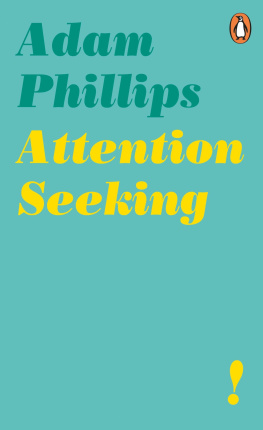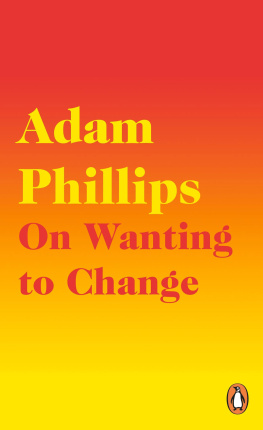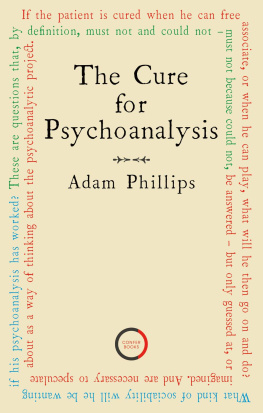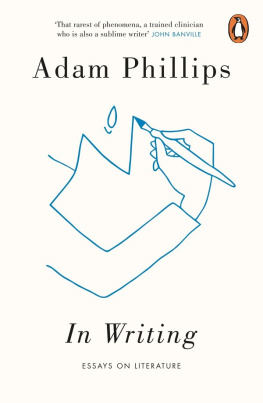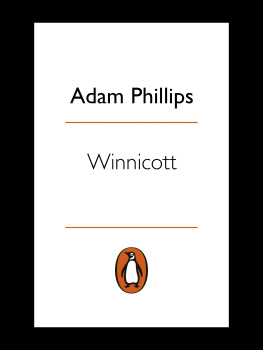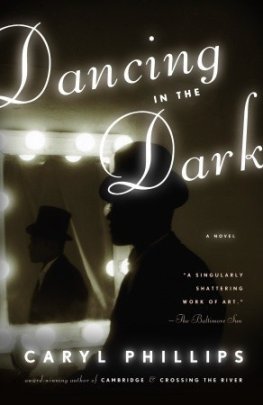Adam Phillips - Attention seeking
Here you can read online Adam Phillips - Attention seeking full text of the book (entire story) in english for free. Download pdf and epub, get meaning, cover and reviews about this ebook. year: 2019, genre: Religion. Description of the work, (preface) as well as reviews are available. Best literature library LitArk.com created for fans of good reading and offers a wide selection of genres:
Romance novel
Science fiction
Adventure
Detective
Science
History
Home and family
Prose
Art
Politics
Computer
Non-fiction
Religion
Business
Children
Humor
Choose a favorite category and find really read worthwhile books. Enjoy immersion in the world of imagination, feel the emotions of the characters or learn something new for yourself, make an fascinating discovery.
- Book:Attention seeking
- Author:
- Genre:
- Year:2019
- Rating:5 / 5
- Favourites:Add to favourites
- Your mark:
- 100
- 1
- 2
- 3
- 4
- 5
Attention seeking: summary, description and annotation
We offer to read an annotation, description, summary or preface (depends on what the author of the book "Attention seeking" wrote himself). If you haven't found the necessary information about the book — write in the comments, we will try to find it.
Attention seeking — read online for free the complete book (whole text) full work
Below is the text of the book, divided by pages. System saving the place of the last page read, allows you to conveniently read the book "Attention seeking" online for free, without having to search again every time where you left off. Put a bookmark, and you can go to the page where you finished reading at any time.
Font size:
Interval:
Bookmark:
Adam Phillips, formerly Principle Child Psychotherapist at Charing Cross Hospital, London, is a practising psychoanalyst and a visiting professor in the English department at the University of York. He is the author of numerous works of psychoanalysis and literary criticism, including most recently In Writing, Unforbidden Pleasures and Missing Out. He is General Editor of the Penguin Modern Classics Freud translations, and a Fellow of The Royal Society of Literature.
Winnicott
On Kissing, Tickling and Being Bored
On Flirtation
Terror and Experts
Monogamy
The Beast in the Nursery
Darwins Worms
Promises, Promises
Houdinis Box
Equals
Going Sane
Intimacies (with Leo Bersani)
Side Effects
On Kindness (with Barbara Taylor)
The Concise Dictionary of Dress (with Judith Clark)
On Balance
Missing Out
One Way and Another
Unforbidden Pleasures
Becoming Freud
The Vulgar (with Judith Clark)
In Writing
EDITOR OF
Charles Lamb: Selected Prose
Walter Pater: The Renaissance
Edmund Burke: A Philosophical Enquiry
The Electrified Tightrope: Selected Psychoanalytic
Papers of Michael Eigen
Richard Howard: Selected Poems
(with Hugh Haughton)
John Clare in Context (with Hugh Haughton)
The Book of Interruptions (with David Hillman)
General Editor of the new Penguin Modern
Classics Freud translations

PENGUIN BOOKS
UK | USA | Canada | Ireland | Australia
India | New Zealand | South Africa
Penguin Books is part of the Penguin Random House group of companies whose addresses can be found at global.penguinrandomhouse.com.

First published 2019
Copyright Adam Phillips, 2019
The moral right of the author has been asserted
ISBN: 978-0-241-98673-8
This ebook is copyright material and must not be copied, reproduced, transferred, distributed, leased, licensed or publicly performed or used in any way except as specifically permitted in writing by the publishers, as allowed under the terms and conditions under which it was purchased or as strictly permitted by applicable copyright law. Any unauthorized distribution or use of this text may be a direct infringement of the authors and publishers rights and those responsible may be liable in law accordingly.
For Marianne
What we mean by feeling interest, I think, is the free acceptance of the gift of pleasure.
Robert Pinsky, Poetry and Pleasure
I needed the sort of accomplices who were either completely faithful to the idea that what I was doing was legitimate, or else were not entirely aware of what my plan consisted of.
Muriel Spark, Loitering with Intent
the romance of motifs without the banality of motives.
Matthew Bevis, My Coincidences
Self-consciousness anticipates an excess of seeing.
Jenny Xie, Visual Orders

These essays began as talks and lectures, and have been revised for this book. Vacancies of Attention was given at the Provoking Attention Conference at Brown University, Rhode Island, in 2017, organised by Amanda Anderson and David Russell. Shame and Attention was published in Salmagundi; I am grateful as ever for the editing and hospitality of Bob and Peg Boyers. Greenblatts Distraction was given on the occasion of Stephen Greenblatt receiving the Holberg Prize, in Bergen, in 2016. The three essays on attention were also given, in different versions, at the University of York.
I am grateful, as always, for the friendship and conversation of Hugh Haughton, Kit Fan, Matthew Bevis, Chris Oakley, David Russell, Stephen Greenblatt, Ramie Targoff, Barbara Taylor, Norma Clarke, Tom Weaver, Brian Cummins, Geoffrey Weaver and John Gray. Simon Prosser is my reliably inspiring editor. And Judith Clark, as always, has made this book and much else possible.
It is awfully important to know what is and what is not your business.
Gertrude Stein, What is English Literature
Everything depends on what, if anything, we find interesting on what we are encouraged and educated to find interesting, and what we find ourselves being interested in despite ourselves. And when we are interested, we pay attention: sometimes, at considerable cost. There is our official curiosity and our unofficial curiosity: our official curiosity is a form of obedience, an indebtedness to the authorities. In our unofficial curiosity we dont know who we want to be judged by. It is the difference between knowing what we are doing, and following our eyes.
It is through both kinds of interest that we tend to recognise and characterise ourselves and other people. We get hooked, the critic Aaron Schuster writes in The Trouble with Pleasure,
on certain things, impressions, patterns, rhythms, words that give a warped consistency to our world, the grain of madness that provides us with our style and character, our secret coherence whether this saves us or drives us to our doom.
Our attention is attracted, and we attract attention, in very specific, idiosyncratic ways. We are not hooked by anything and everything; we dont desire everybody; only particular people, images, things, patterns, rhythms and words affect us. Indeed, what is striking, as Schuster suggests, is just how selective we are, and how much we assume our coherence, however secretly; as though everything about ourselves could be connected if only we had the wherewithal. Whether or not it is a grain of madness that provides us with our style and character, this assembling of our selves through what we notice, through what, as we say, attracts our attention both consciously and unconsciously and just how surely we limit the repertoire of what we do notice, smacks of addiction (we get hooked); and of a fundamental unknowingness about how we make ourselves up. As though what we call our identity, which is to do with what we notice, is a kind of fixation, an obsession with certain ideas about ourselves. What we might call our taste, or more simply our preferences, becomes a type of fate, or a preferred picture of ourselves (which saves us or drives us to our doom). The famous surrealist motto, Tell me what you are haunted by and I will tell you who you are, all too easily translates into Tell me what you are interested in and I will tell you who you are.
There is an assumption in psychoanalysis, as in the wider culture, that we are by nature interested creatures, driven to pay attention (at least once we have learned what it means to pay). That growing-up, ideally, means discovering ones interests; initially our apparently innate interest in our own survival, and our imaginative elaboration of this; and then, depending on our affluence and our inventiveness, our following of our curiosity as far as we are able. We may think of our attention as inspired by need, and formed by nurture (attention as another word for appetite). Babies and young children are, as we know, very intent on what they want, very intolerant of frustration, and very troubled by being bored, by losing interest in things. So we are prone, as adults, if we are lucky enough, to take our interests for granted, rather than be unduly bothered by them. Only when they become in some way disturbing do we become interested in our interest (interest then being a word for phobia, or obsession, or perversion, or addiction, or ideology, or hobby, or discipline). Our so-called symptoms narrow our minds by forcing our attention; and reveal, by the same token, just how much it is forced attention that we suffer from (so-called sexual perversions confine our interest in sex; anxiety and depression over-focus our attention; and this may be part of their function). It is, though, one of our projects to circumscribe the range and intensity of our curiosity; as though our capacity for interest was itself threatening, by being so potentially promiscuous, or unbounded, or unpredictable. As though we always have too much or too little appetite, too much or too little danger. Our interest in anything or anyone threatens to become excessive, or not excessive enough.
Font size:
Interval:
Bookmark:
Similar books «Attention seeking»
Look at similar books to Attention seeking. We have selected literature similar in name and meaning in the hope of providing readers with more options to find new, interesting, not yet read works.
Discussion, reviews of the book Attention seeking and just readers' own opinions. Leave your comments, write what you think about the work, its meaning or the main characters. Specify what exactly you liked and what you didn't like, and why you think so.

